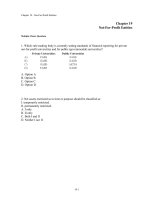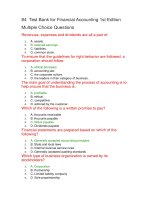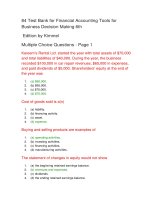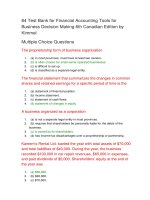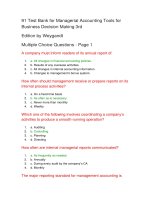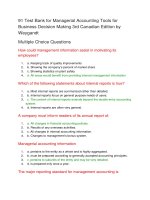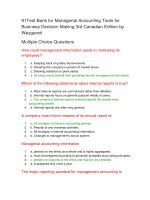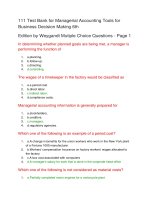84 test bank for financial accounting tools for business decision making 6th
Bạn đang xem bản rút gọn của tài liệu. Xem và tải ngay bản đầy đủ của tài liệu tại đây (44.34 KB, 14 trang )
84 Test Bank for Financial Accounting Tools for
Business Decision Making 6th Canadian Edition by
Kimmel
Multiple Choice Questions
The proprietorship form of business organization
1.
2.
3.
4.
(a) in most provinces, must have at least two owners.
(b) is often chosen for small owner operated businesses.
(c) is difficult to set up.
(d) is classified as a separate legal entity.
The financial statement that summarizes the changes in common
shares and retained earnings for a specific period of time is the
1.
2.
3.
4.
(a) statement of financial position.
(b) income statement.
(c) statement of cash flows.
(d) statement of changes in equity.
A business organized as a corporation
1.
2.
(a) is not a separate legal entity in most provinces.
(b) requires that shareholders be personally liable for the debts of the
business.
3. (c) is owned by its shareholders.
4. (d) has income tax disadvantages over a proprietorship or partnership.
Kareem’s Rental Ltd. started the year with total assets of $70,000
and total liabilities of $40,000. During the year, the business
recorded $100,000 in car repair revenues, $65,000 in expenses,
and paid dividends of $5,000. Shareholders’ equity at the end of
the year was
1.
2.
3.
4.
(a) $60,000.
(b) $65,000.
(c) $70,000.
(d) $75,000.
Resources owned by a corporation are referred to as
1.
2.
3.
4.
(a) shareholders’ equity.
(b) liabilities.
(c) assets.
(d) revenues.
Which of the following would not be considered an external user
of accounting data?
1.
2.
3.
4.
(a) Canada Revenue Agency
(b) management
(c) creditors
(d) customers
Allocating the cost of using long-term assets over their useful
lives is called
1.
2.
3.
4.
(a) allocation expense.
(b) depreciation expense.
(c) a general expense.
(d) asset use expense.
The liability created by a business when it purchases coffee
beans and coffee cups on credit from suppliers is called a(n)
1.
2.
3.
4.
(a) account payable.
(b) account receivable.
(c) revenue.
(d) expense.
The partnership form of business organization
1.
2.
3.
4.
(a) is a separate legal entity.
(b) is a common form of organization for service-type businesses.
(c) enjoys an unlimited life.
(d) has limited liability.
A corporation has which of the following set of characteristics?
1.
(a) shareholder control, income tax disadvantages, increased skills and
resources
2. (b) simple to set up and maintains control with founder
3. (c) harder to raise funds and gives shareholders control
4. (d) Easier to transfer ownership and raise funds, no personal liability
Which of the following uses accounting information to determine
whether a marketing proposal will be cost effective?
1.
2.
3.
4.
(a) shareholders
(b) marketing managers
(c) creditors
(d) Human Resource managers
An advantage of the corporate form of business is that
1.
2.
(a) it has limited life.
(b) its shareholders’ personal resources are at stake.
3.
4.
(c) its ownership is easily transferable via the sale of shares.
(d) it is simple to establish.
A small neighbourhood barber shop that is operated by its owner
would likely be organized as a
1.
2.
3.
4.
(a) public corporation.
(b) partnership.
(c) private corporation.
(d) proprietorship.
The common characteristic possessed by all assets is
1.
2.
3.
4.
(a) long life.
(b) great monetary value.
(c) tangible nature.
(d) future economic benefit.
The concept that economic activity which can be identified with a
particular company must be kept separate and distinct from the
owner(s) and from all other economic entities is known as
1.
2.
3.
4.
(a) the separation concept.
(b) the reporting entity concept.
(c) the economic concept.
(d) the business organization concept.
Retained earnings at the end of the period is equal to
1.
(a) retained earnings at the beginning of the period plus profit minus
liabilities.
2. (b) retained earnings at the beginning of the period plus profit minus
dividends.
3. (c) profit for the period.
4. (d) assets plus liabilities.
Which of the following uses accounting information to determine
whether a company’s profit will result in a share price increase?
1.
2.
3.
4.
(a) shareholders
(b) marketing managers
(c) creditors
(d) Chief Financial Officer
The cost of assets consumed or services used is also known as
a(n)
1.
2.
3.
4.
(a) revenue.
(b) expense.
(c) liability.
(d) asset.
Liabilities of a company are owed to
1.
2.
3.
4.
(a) debtors.
(b) owners.
(c) creditors.
(d) shareholders.
A business organized as a separate legal entity is a
1.
2.
3.
4.
(a) corporation.
(b) proprietorship.
(c) government unit.
(d) partnership.
Dividends are reported on
1.
2.
3.
4.
(a) the income statement.
(b) the statement of changes in equity.
(c) the statement of financial position.
(d) both the income statement and statement of financial position.
Liabilities:
1.
2.
3.
4.
(a) are future economic benefits.
(b) are debts and obligations.
(c) possess service potential.
(d) are things of value owned by a business.
Buying and selling products are examples of
1.
2.
3.
4.
(a) operating activities.
(b) investing activities.
(c) financing activities.
(d) manufacturing activities.
Which of the following statements is not true?
1.
2.
(a) Public corporations must use international financial reporting standards.
(b) Private corporations can choose to use either international financial
reporting standards (IFRS) or accounting standards for private enterprises
(ASPE).
3. (c) Both public and private corporations issue shares.
4. (d) All private corporations are small.
Which form of business would have its shares listed on a stock
exchange?
1.
2.
3.
4.
(a) proprietorship
(b) partnership
(c) private corporation
(d) public corporation
External users want answers to all of the following questions
except
1.
2.
3.
4.
(a) Is the company earning satisfactory income?
(b) Will the company be able to pay its debts as they come due?
(c) Will the company be able to afford employee pay raises this year?
(d) How does the company compare in profitability with competitors?
Which of the following is the most appropriate definition of
accounting?
1.
(a) The information system that identifies, records, and communicates the
economic events of an organization to interested users.
2. (b) a means of collecting information
3. (c) The interconnected network of subsystems necessary to operate a
business.
4. (d) electronic collection, organization, and communication of vast amounts
of information
Which financial statement is prepared first?
1.
2.
3.
4.
(a) Statement of financial position
(b) Income statement
(c) Statement of changes in equity
(d) Statement of cash flows
Buying assets needed to operate a business is an example of
a(n)
1.
2.
3.
4.
(a) purchasing activity.
(b) financing activity.
(c) investing activity.
(d) operating activity.
A company’s policy toward dividends and growth could best be
determined by examining the
1.
2.
3.
4.
(a) statement of financial position.
(b) income statement.
(c) statement of changes in equity.
(d) statement of cash flows.
The right to receive money in the future is called a(n)
1.
2.
3.
4.
(a) account payable.
(b) account receivable.
(c) liability.
(d) revenue.
Profit results when
1.
2.
3.
4.
(a) Assets > Liabilities.
(b) Assets < Liabilities.
(c) Revenues > Expenses.
(d) Revenues < Expenses.
Which of the following activities involves raising the necessary
funds to support the business?
1.
2.
3.
4.
(a) operating
(b) investing
(c) financing
(d) marketing
The statement of changes in equity would not show
1.
2.
3.
4.
(a) the beginning retained earnings balance.
(b) revenues and expenses.
(c) dividends.
(d) the ending retained earnings balance.
The accounting equation may be expressed as
1.
2.
3.
4.
(a) Assets = Shareholders’ Equity – Liabilities.
(b) Assets = Liabilities + Shareholders’ Equity.
(c) Assets + Liabilities = Shareholders’ Equity.
(d) Assets + Shareholders’ Equity = Liabilities.
Dividends
1.
2.
3.
4.
(a) increase assets.
(b) increase expenses.
(c) decrease revenues.
(d) decrease retained earnings.
A statement of financial position shows
1.
2.
3.
4.
(a) revenues, liabilities, and shareholders’ equity.
(b) expenses, dividends, and shareholders’ equity.
(c) revenues, expenses, and dividends.
(d) assets, liabilities, and shareholders’ equity.
Which of the following uses accounting information to determine
whether a company can pay its obligations?
1.
2.
3.
4.
(a) shareholders
(b) marketing managers
(c) creditors
(d) Canada Revenue Agency
An income statement
1.
(a) summarizes the changes in retained earnings for a specific period of
time.
2. (b) reports the changes in assets, liabilities, and shareholders’ equity over a
period of time.
3. (c) reports the assets, liabilities, and shareholders’ equity at a specific date.
4. (d) reports the revenues and expenses for a specific period of time.
Which of the following would not be considered an internal user of
accounting data for XYZ Inc.?
1.
2.
3.
4.
(a) the company president
(b) production manager
(c) merchandise inventory clerk
(d) receptionist of the employees’ labour union
If the retained earnings account increases from the beginning of
the year to the end of the year, then
1.
2.
3.
4.
(a) profit is greater than dividends.
(b) a loss is less than dividends.
(c) additional investments are less than reported losses.
(d) dividends were received.
Cost of goods sold is a(n)
1.
2.
3.
4.
(a) liability.
(b) financing activity.
(c) asset.
(d) expense.
Debt and obligations of a business are referred to as
1.
2.
3.
4.
(a) assets.
(b) equities.
(c) liabilities.
(d) expenses.
The world’s economic systems depend on financial reporting that
is
1.
2.
3.
4.
(a) highly transparent.
(b) accurate.
(c) reliable.
(d) all of the above.
Which of the following groups uses accounting information
primarily to ensure the company is operating within prescribed
rules?
1.
2.
(a) taxing authorities
(b) regulatory agencies
3.
4.
(c) labour unions
(d) management
Which of the following would not be considered an internal user of
accounting data?
1.
2.
3.
4.
(a) the president of a company
(b) the controller of a company
(c) a creditor of a company
(d) a salesperson of a company
Expenses are incurred
1.
2.
3.
4.
(a) only on rare occasions.
(b) to produce assets.
(c) to produce liabilities.
(d) to generate revenues.
Which of the following is not a principal type of business activity?
1.
2.
3.
4.
(a) operating
(b) investing
(c) financing
(d) marketing
84 Free Test Bank for Financial Accounting Tools for
Business Decision Making 6th Canadian Edition by
Kimmel Multiple Choice Questions - Page 2
Retained earnings are
1.
2.
3.
4.
(a) the shareholders’ claim on total assets.
(b) equal to cash.
(c) equal to revenues.
(d) the amount of profit kept in the corporation for future use.
The statement of financial position reports
1.
2.
3.
4.
a) assets owned by the business.
b) claims to assets by creditors.
c) claims to assets by shareholders.
d) all of the above.
The statement of financial position
1.
(a) summarizes the changes in shareholders’ equity for a specific period of
time.
2. (b) reports the changes in assets, liabilities, and shareholders’ equity over a
period of time.
3. (c) reports the assets, liabilities, and shareholders’ equity at a specific date.
4.
(d) presents the revenues and expenses for a specific period of time.
Saira’s Maid Service Ltd. began the year with total assets of
$120,000 and shareholders’ equity of $40,000. During the year,
the company earned $90,000 in profit and paid $20,000 in
dividends. Total assets at the end of the year were $215,000.
Shareholders’ equity at the end of the year was
1.
2.
3.
4.
a) $130,000.
b) $110,000.
c) $150,000.
d) $135,000.
Which of the following would not appear directly on the statement
of changes in equity?
1.
2.
3.
4.
a) beginning retained earnings balance
b) dividends
c) service revenue
d) profit
Internal users want answers to all of the following questions
except
1.
2.
3.
4.
a) what is the cost of manufacturing each unit of the product?
b) which product line is more profitable?
c) is the company earning enough to give me a return on my investment?
d) is cash sufficient to pay the bills?
Which of the following would appear on the statement of financial
position?
1.
2.
3.
4.
a) service revenue
b) interest expense
c) profit
d) accounts receivable
Which of the following would not appear on the income
statement?
1.
2.
3.
4.
a) service revenue
b) interest expense
c) profit
d) dividends
Which financial statement would indicate whether the company
relies more on debt or on shareholders’ equity to finance its
assets?
1.
(a) Statement of cash flows
2.
3.
4.
(b) Statement of changes in equity
(c) Income statement
(d) Statement of financial position
Repayment of non-current notes payable is an example of a (an)
1.
2.
3.
4.
a) operating activity.
b) financing activity.
c) investing activity.
d) delivery activity.
Which of the following financial statements would you use to
determine a company’s source(s) of financing?
1.
2.
3.
4.
a) statement of financial position
b) income statement
c) statement of changes in equity
d) bank statement
If total liabilities increased by $15,000 and shareholders’ equity
increased by $15,000 during a period of time, then total assets
must change by what amount and direction (increase or
decrease) during that same period?
1.
2.
3.
4.
(a) $15,000 decrease
(b) $15,000 increase
(c) $30,000 decrease
(d) $30,000 increase
The statement of changes in equity is dependent on the results of
the
1.
2.
3.
4.
a) income statement.
b) statement of financial position.
c) statement of cash flow.
d) statement of assets and liabilities.
Payments to shareholders are called
1.
2.
3.
4.
(a) expenses.
(b) liabilities.
(c) dividends.
(d) shares.
Which of the following financial statements is concerned with the
company at a point in time?
1.
2.
3.
(a) Statement of financial position
(b) Income statement
(c) Statement of changes in equity
4.
(d) Statement of cash flows
Cost of goods sold is classified as a(n)
1.
2.
3.
4.
a) asset.
b) expense.
c) liability.
d) revenue.
The statement that is dated at a specific point in time is the
1.
2.
3.
4.
a) statement of cash flows.
b) statement of financial position.
c) statement of changes in equity.
d) Both b) and c) are correct.
To determine how much of a company’s cumulative profits has
been distributed to its shareholders, one would refer to the
1.
2.
3.
4.
a) statement of financial position.
b) notes to the financial statements.
c) statement of cash flows.
d) statement of changes in equity.
Kareem’s Rental Ltd. started the year with total assets of $70,000
and total liabilities of $40,000. During the year, the business
recorded $100,000 in car repair revenues, $65,000 in expenses,
and paid dividends of $5,000.The profit reported for the year was
1.
2.
3.
4.
(a) $30,000.
(b) $35,000.
(c) $20,000.
(d) $100,000.
Which of the following is not an external user of accounting data?
1.
2.
3.
4.
a) labour unions
b) customers
c) economic planners
d) finance directors
Common shares are reported on
1.
2.
3.
4.
(a) the statement of financial position.
(b) the statement of changes in equity.
(c) both the statement of financial position and the income statement.
(d) both the statement of changes in equity and the statement of financial
position.
The financial statements are usually prepared in which of the
following sequence?
1.
a) Income statement, Statement of financial position, Statement of changes
in equity, Statement of cash flows
2. b) Statement of financial position, Statement of changes in equity,
Statement of cash flows, Income statement
3. c) Statement of financial position, Statement of cash flows, Income
statement, Statement of changes in equity
4. d) Income statement, Statement of changes in equity, Statement of financial
position, Statement of cash flows
Shareholders’ equity can be described as claims of
1.
2.
3.
4.
(a) creditors on total assets.
(b) owners on total assets.
(c) customers on total assets.
(d) debtors on total assets.
The statement of financial position and statement of changes in
equity are related because
1.
(a) the total assets on the statement of financial position is reported on the
statement of changes in equity.
2. (b) the ending amount on the statement of changes in equity is reported on
the statement of financial position.
3. (c) the ending amount on each statement is transferred to the statement of
cash flows.
4. (d) both contain information for the corporation.
Financial statements are prepared to provide information to which
users?
1.
2.
3.
4.
a) regulators
b) bond holders
c) investors
d) all of the above
Purchasing a new building is an example of a(n)
1.
2.
3.
4.
a) operating activity.
b) financing activity.
c) investing activity.
d) delivery activity.
The statement of changes in equity is dependent on the results
from
1.
2.
3.
4.
(a) the statement of cash flows.
(b) the statement of financial position.
(c) the income statement.
(d) a company's share capital.
The statement of financial position and the statement of changes
in equity are interrelated because
1.
a) the beginning amount of retained earnings on the statement of changes
in equity is reported on the statement of financial position.
2. b) the amount of assets on the statement of financial position is reported on
the statement of changes in equity.
3. c) the ending amount of each of the components of shareholders’ equity on
the statement of changes in equity is reported on the statement of financial
position.
4. d) the amount of liabilities on the statement of financial position is reported
on the statement of changes in equity.
The primary purpose of the statement of cash flows is to report
1.
2.
3.
4.
(a) a company's investing transactions.
(b) a company's financing transactions.
(c) information about cash receipts and cash payments of a company.
(d) the net increase or decrease in cash.
Easy transfer of ownership is a characteristic of which form of
business organization?
1.
2.
3.
4.
a) proprietorship
b) partnership
c) publicly-traded corporation
d) all of the above
Which of the following would be considered an investing activity?
1.
2.
3.
4.
a) the recording of depreciation expense
b) the retirement of outstanding debt
c) the purchase of inventory for resale
d) the construction of a new factory
The statement of cash flows and the statement of financial
position are interrelated because
1.
(a) the ending amount of cash on the statement of cash flows must agree
with the amount on the income statement.
2. (b) the ending amount of cash on the statement of cash flows must agree
with the amount in the statement of changes in equity.
3. (c) the ending amount of cash on the statement of cash flows must agree
with the amount in the statement of financial position.
4. (d) both disclose the corporation's profit.
Shareholders’ equity is usually comprised of
1.
2.
3.
(a) common shares and dividends.
(b) common shares and retained earnings.
(c) dividends and retained earnings.
4.
(d) profit and retained earnings.
Which of the following type of companies must adopt International
Financial Reporting Standards?
1.
2.
3.
4.
a) proprietorship
b) publicly-traded corporations
c) partnerships
d) private corporations
Common shares represent
1.
2.
3.
4.
(a) the creditors’ claims on the company.
(b) the total profit of the company to date.
(c) the amount paid by investors for ownership in the company.
(d) the owners’ claims on the company.
If total liabilities decreased by $45,000 during a period of time and
shareholders’ equity increased by $27,000 during the same
period, then the amount and direction (increase or decrease) of
the period’s change in total assets is a(n)
1.
2.
3.
4.
(a) $45,000 increase.
(b) $27,000 increase.
(c) $18,000 decrease.
(d) $18,000 increase.
